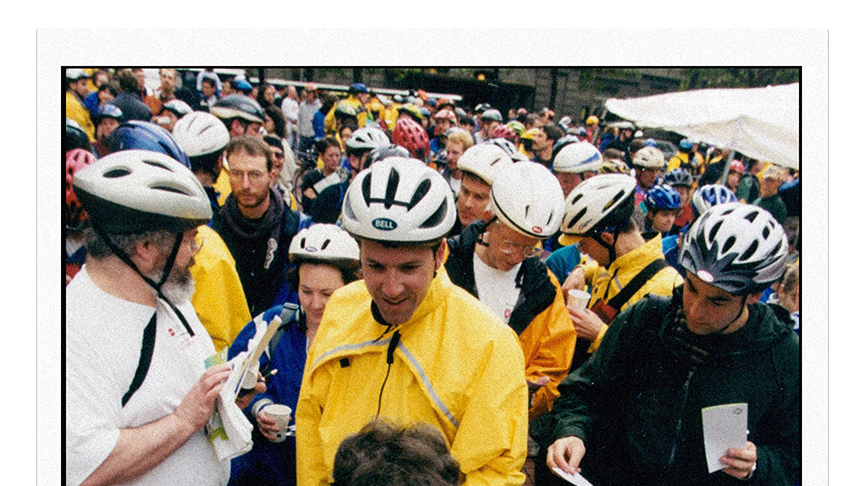Rex Burkholder recalls a simple motivation for co-founding the Bicycle Transportation Alliance.
“I got tired of thinking I was going to die every time I got on my bike,” says Burkholder, who went on to serve three terms on the Metro Council.
Burkholder recalls riding on Northeast Broadway in 1991 with his 5-year-old son. His son stopped abruptly and they almost got run over by a semitrailer because there was no shoulder—and certainly no bike lane.
As Burkholder visited a string of local officials to talk about bike lanes—the Portland Bureau of Transportation for city streets and Multnomah County for bridges—he got a chilly reception, even from then-Transportation Commissioner Earl Blumenauer, who would later build a political persona around bicycles.
Burkholder cited a 1971 law that said cities must provide access for bicycles and pedestrians “wherever a highway, road or street is being constructed, reconstructed or relocated.” Bureaucrats were unmoved. Finally, he recalls, Mayor Vera Katz politely suggested the BTA sue the city to resolve their disagreement.
In 1993, the Oregon Supreme Court found in the BTA’s favor. That victory set Portland on a path to becoming one of America’s best bicycling cities, with more than 400 miles of bike lanes today—up from zero when the BTA started.
It’s also true the bike movement has lost some momentum in recent years. “In 1990, we hoped it would be 20 years to become like Amsterdam,” Burkholder says. “We are not there.”
A decade ago, the segment of Portlanders commuting by bike peaked at 7.2%, according to city figures. That number dipped to 5.4% before the pandemic and has declined since with the proliferation of remote work. But in a variety of ways, the BTA changed Portland culture permanently, giving rise to activist groups such as Bike Loud, the popular online publication Bike Portland and, of course, Portland’s World Naked Bike Ride, which has attracted as many as 10,000 bare-skinned pedalers.
In 2017, the BTA changed its name to the Street Trust, broadening its mission to include “all street users regardless of mode” and expanding its focus statewide.
Burkholder, now 68, fresh off an attempted political comeback (he ran for Portland City Council earlier this month) is still on his bike every day, and he’s encouraged by what he sees: separated bike lanes on Naito Parkway, fewer cars on Foster Road and green streets everywhere. All the improvements put him in mind of the lesson he learned from Mayor Katz: “Government doesn’t move unless it’s pushed.”
Next Story > 1993: Julie Mancini
 Opens in new window
Opens in new window